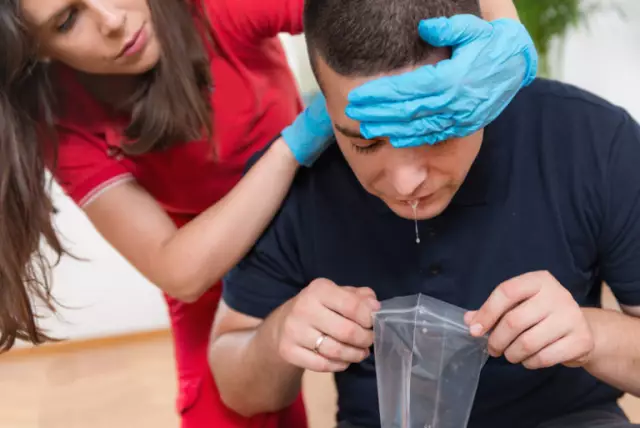- Author Rachel Wainwright wainwright@abchealthonline.com.
- Public 2023-12-15 07:39.
- Last modified 2025-11-02 20:14.
Manganese poisoning
Manganese is a metal that is not found in its pure form on our planet. Its salts are widely used in metallurgy to give high strength to steel, as well as in the manufacture of electrical and electronic products.

Source: depositphotos.com
Manganese and its compounds are highly toxic. Poisoning by them is observed in workers of the steel-making, ore-dressing and mining industries, as well as in those employed in the production of electrodes and in welders, that is, where there is contact with this metal during work.
How does manganese poisoning happen?
Most often, manganese enters the body in the form of dust by inhaling polluted air. To a lesser extent, it is able to penetrate through the gastrointestinal tract, salivary glands and skin.
Manganese dust is deposited in the lung tissue, which leads to the development of recurrent pneumonia and fibrosis, a condition called manganoconiosis.
From the lungs, manganese partially enters the bloodstream, is carried throughout the body and is deposited in the lymph nodes, pancreas and thyroid glands, liver, kidneys, and brain, leading to disruption of their functions.
The cortex of the cerebral hemispheres is very sensitive to the toxic effect of manganese, it is affected already in the early stages of poisoning. Then, subcortical formations are drawn into the pathological process, which is the reason for the development of a condition characteristic of manganese poisoning - manganese parkinsonism.
Poisoning symptoms
Manganese belongs to cumulative poisons, that is, symptoms of poisoning appear after a certain time of contact with it, when its concentration in the body is sufficiently high. Therefore, manganese poisoning has the character of chronic intoxication, in the course of which several periods can be distinguished.
Stage of functional disorders
This stage is often not diagnosed, since its symptoms are common to many diseases. These include:
- increased fatigue;
- memory impairment;
- headache and dizziness;
- muscle weakness of the upper limbs;
- decreased or complete lack of appetite;
- decreased sex drive;
- violations of potency in men and menstrual function in women;
- pain in the epigastric region;
- an increase in the size of the thyroid gland.
Stage of initial toxic encephalopathy
At this stage, toxic damage to the cerebral cortex occurs. Clinically, this is manifested by the following symptoms:
- increased muscle tone;
- gait disturbances;
- fixed gaze;
- blinking;
- slow and very quiet speech;
- weakening of the severity of reflexes.
Manganese parkinsonism stage
At this stage, intoxication leads to gross damage to the subcortical structures, which has the following manifestations:
- rigidity of skeletal muscles;
- violation of the functions of facial muscles, as a result of which the face becomes masked;
- slowness of movements;
- monotonous and blurry speech;
- disorders of the intellectual sphere.

Source: depositphotos.com
First aid for manganese poisoning
Manganese poisoning is chronic, so there is no need to provide the victim with first aid. If you find the first signs of manganese intoxication, you should immediately consult a doctor.
When is medical attention needed?
Medical attention is required in 100% of cases of manganese poisoning.
First of all, the patient must be removed from further work in hazardous production in order to stop the further intake of poison into the body.
Intravenous injections of Ascorbic acid, Vitamin B 1, Glucose solution have a good effect at the stage of functional disorders. For the treatment of polyneuritic syndrome, intravenous administration of a 0.5% solution of Novocaine and subcutaneous administration of Proserin are indicated.
To accelerate the excretion of manganese from the body, complexing therapy with a calcium tetacin complexone (calcium disodium salt of ethylenediamine tetraacetic acid) is carried out.
With the development of manganese parkinsonism, symptomatic therapy is carried out, aimed at weakening the severity of pathological symptoms. For this, Dinesin, tincture of belladonna root, Scopolamine, Corbella, Tropacin are used.
Possible consequences
The prognosis for manganese poisoning is always serious. Even the complete cessation of contact with the poison and the treatment carried out does not guarantee the elimination of damage to the structures of the brain.
With the development of toxic encephalopathy and manganese parkinsonism, patients steadily lose their ability to work, in this case disability is formalized.
Prevention
When working in industries where manganese is involved, it is important to carefully observe safety requirements. In the premises, supply and exhaust ventilation must be constantly carried out, which makes it possible to reduce the concentration of manganese dust in the air.
After the end of the work shift, workers must take a shower and hand over their work clothes to the wash. Medical examinations are required on a quarterly basis.
It is important that workers employed in hazardous industries eat healthy food. The diet should be balanced in essential nutrients and include sufficient fresh fruits and vegetables. Such nutrition helps prevent the occurrence of iron deficiency anemia, thereby reducing the body's susceptibility to the toxic effects of manganese.
If, during the medical examination, an employee is suspected of possible manganese poisoning, he should immediately be removed from work and sent for treatment.

Elena Minkina Doctor anesthesiologist-resuscitator About the author
Education: graduated from the Tashkent State Medical Institute, specializing in general medicine in 1991. Repeatedly passed refresher courses.
Work experience: anesthesiologist-resuscitator of the city maternity complex, resuscitator of the hemodialysis department.
The information is generalized and provided for informational purposes only. At the first sign of illness, see your doctor. Self-medication is hazardous to health!






